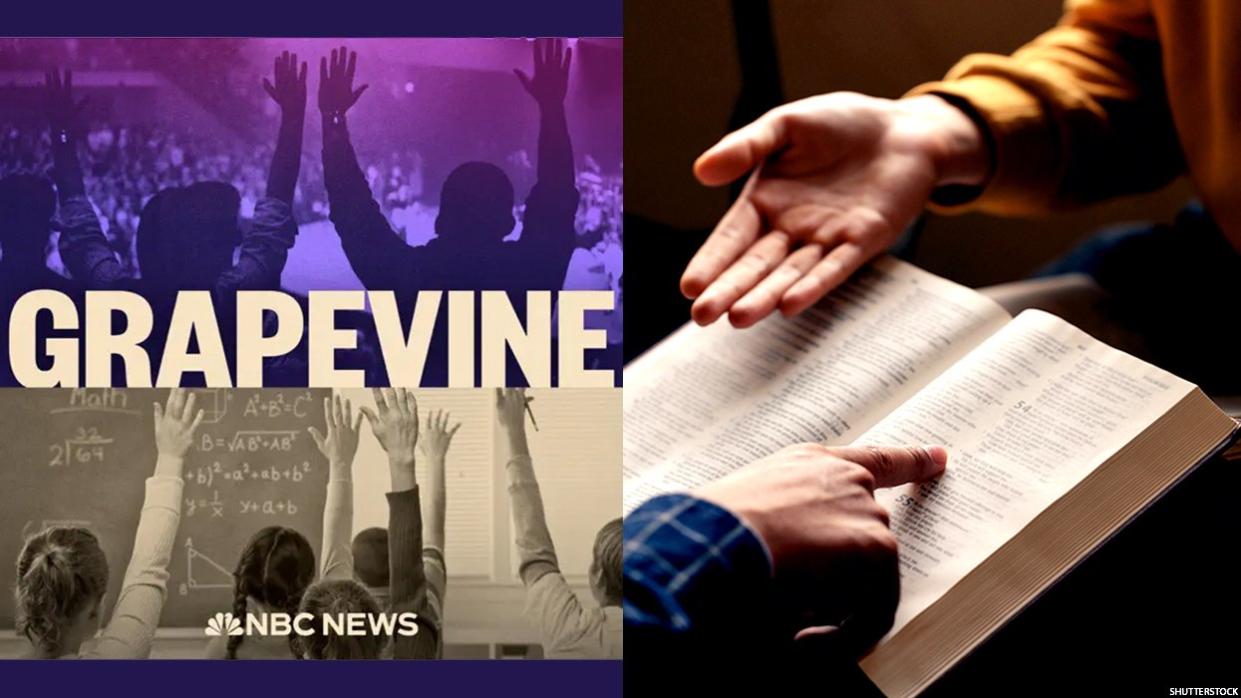Christian Nationalists Are Infiltrating Schools to Make Them Anti-LGBTQ+: Report

- Oops!Something went wrong.Please try again later.
- Oops!Something went wrong.Please try again later.
A burgeoning Christian nationalist movement is looking to reintegrate religious traditions in schools, particularly in Texas, bringing a wave of anti-LGBTQ+ policies with it.
The NBC News podcast Grapevine examines this infiltration of far-right actors into school districts. Those groups claim to want to eradicate “indoctrination” by “woke” educators and leaders.
Former President Donald Trump lamented the exclusion of religious teachings in schools at the Conservative Political Action Conference last year. “School prayer is banned, but drag shows are allowed to permeate the whole place,” Trump said. He later stressed the resonance of this narrative with his supporters in a speech in North Carolina, NBC reports.
Central to this unfolding situation is the state of Texas, particularly the suburban area of Grapevine. Here, the report highlighted how newly elected school board members, backed by far-right Christian supporters, approved a plan restricting mentions of “gender fluidity” in classrooms and libraries. Similar scenarios are playing out nationwide, showcasing a concerted effort to meld religious traditions with educational policies.
I texted @ahylton26 the next day, and we got to work.\n\nThe result: Our new podcast, "Grapevine," was released yesterday.\n\nYou can listen to the first two episodes by clicking here: https://t.co/2GMvr0p0ZD\n\n4/
— Mike Hixenbaugh (@Mike Hixenbaugh) 1696516728
In a significant episode from August 2022, a mother at a packed school board meeting in Grapevine accused a teacher of influencing her child to transition genders, exclaiming, “I lost my son.” However, a complex effort was revealed upon deeper investigation by NBC reporters Mike Hixenbaugh and Antonia Hylton.
According to a description of the podcast, it’s a tale of a transgender child yearning for understanding, a mother rooted in her religious beliefs, and an English teacher caught amid this religious and social discord. The podcast underscores the broader implications, depicting it as part of a larger religious movement with a growing influence over educational policies based on evangelical interpretations of biblical values, according to NBC.
In Oklahoma and Florida, state officials are advancing Christian-centric agendas within the educational sphere. Oklahoma’s Republican education chief, Ryan Walters, has advocated for displaying the Ten Commandments in classrooms.
School board candidates in 3 North Texas districts passed policies restricting lessons on race, gender and sexuality, resulting in hundreds of books' removal from schools\n\n@AHylton26 spoke with a group of students who worry the church is creeping into the public education system
— NBC Nightly News with Lester Holt (@NBC Nightly News with Lester Holt) 1696433463
Concurrently, Florida’s Department of Education approved content from the Christian conservative group PragerU Kids for use in public schools at the same time that it stemmed the mere mention of LGBTQ+ people throughout Florida’s entire public education curriculum and rewritten the history of slavery to include that those who were enslaved benefited from their enslavement because of the skills they learned. This false claim has been widely criticized, but Florida Gov. Ron DeSantis, a candidate for the 2024 GOP presidential nomination, has defended his education department’s point of view.
Texas state Rep. Nate Schatzline, who wrote the state’s anti-drag bill but himself dressed in drag previously, aligned with the conservative Christian movement, underscored the importance of Christian values in public policies. Regarding the separation of church and state as outlined by the Constitution, he claimed, “The idea was meant ‘to keep the state out of the church,’ not to keep the church out of the state.”
The report also highlighted concerns from LGBTQ+ rights advocates who warn that the escalating rhetoric could incite violence. Ricardo Martinez, CEO of Equality Texas, expressed dismay at seeing faith “weaponized” in this manner, marking a departure from the values of “empathy, compassion, grace” he associated with his religious upbringing.
NBC’s coverage and the accompanying Grapevine podcast revealed a complex tableau of political, religious, and social elements converging on the educational battleground. Amidst a broader national conversation about transgender rights and religious freedom, the narratives unfolding in Republican-controlled states exemplify the contentious dialogue surrounding the future of America’s educational landscape.

